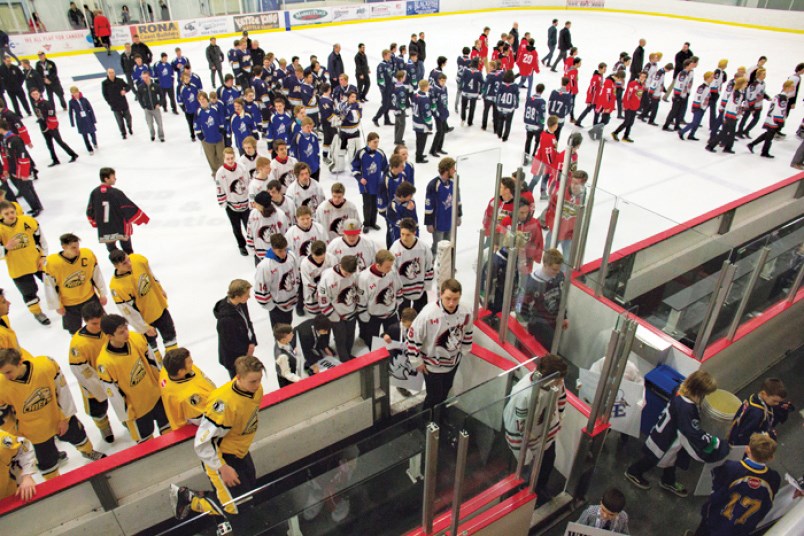In a province-wide call to action, B.C. sports organizations are being asked to erase bullying in sports by creating a more inclusive and safe environment.
According to viaSport BC – a not-for-profit organization with a mandate to increase participation in sports across the province – an environment in which participants, athletes, coaches, volunteers, spectators and officials are exposed to negative experiences – such as bullying – can be harmful and cause individuals to quit.
Sunshine Coast Minor Hockey Association (SCMHA) vice president Sean Gray said that he’s vigilant about issues like bullying. However, the outstanding incidents that Gray has witnessed have not come up between children, but rather from over enthusiastic parents.
“We had an incident a few weeks ago with some West Vancouver parents yelling at our referees as they were coming off the ice,” Gray said. “A couple of these dads were leaning over, yelling at this 18-year-old ref who was coming off the ice because the ref had missed a call. It happens, they’re not professionals.”
Gray spoke to the parents and they left without incident, but he said there are policies in the Sunshine Coast arenas to call the RCMP if anyone is harassing the referees.
Shane Heuring coaches junior boys basketball at Elphinstone and also runs the Sunshine Coast Basketball Club. Like Gray, Heuring said he doesn’t see much peer-to-peer bullying with the kids he coaches.
“When I’m involved, no. I’ve got a pretty good handle on kids and a pretty good sense of situations, so I don’t see it a lot,” Heuring said. “Not to say it doesn’t happen. Coaching high school kids, I hold them to a certain standard. I encourage them to encourage all teammates and that sort of thing. They’re usually pretty good about it when you have a coach that’s on top of it.”
Engaged coaching was a common theme that Gray and Heuring both seemed to agree on. When the coach can stop a situation from escalating or encourage kids to play as a team even if they’re not meshing well, bullying rarely comes up.
“That stuff is becoming less and less prevalent because, I think, there’s more awareness,” Gray said. “It’s not like the ’50s, ’60s or even ’70s. When I was playing hockey when I was younger, there were really no boundaries to that stuff. ‘Ref you suck, you better watch it when you’re going to your car.’ I was 10 years old, I remember that.”
Gray also recalled an incident when the peewee team – ages 11 to 12 – was harassed by parents of the opposing side as they were coming off the ice after a tournament in Abbotsford. The incident involved some name-calling and slurs, which Gray called “disgusting.”
He encouraged anyone dealing with a bully to speak up, even if the bully in question is a coach.
“There’s a lot of it that people won’t speak up about,” Gray said. “They worry that the kid is going to get blacklisted – especially if it’s a coach who’s being mean to a kid. Parents are worried that if they speak up, the chance of their kid making the rep team is going to go down because they’ll be seen as complaining parents. But there have been instances where coaches have centred out a kid in front of the rest of the team because he screwed up a drill.
“Who does that? Professional hockey coaches don’t do that,” Gray said. “Why would a minor hockey coach do that? There are codes of conduct that you sign as a sports coach in our association. One of the biggest ones is, ‘I will not centre out my players in front of their peers.’ That’s very damaging. We try to keep a lid on it but if you don’t speak up we won’t know. You’ve got to speak up and the association board will do their best to get to the bottom of it.”
According to viaSport BC, 94 per cent of B.C. sports organizations surveyed believe sport bullying is a serious problem that needs to be addressed; 55 per cent of B.C. sports organizations surveyed say they know of athletes who have dropped out of sport because of bullying; and 44 per cent of B.C. sports organizations surveyed say they know of officials, coaches, managers, board members and other volunteers who left a sport due to bullying.
Olympic gold medalist Jennifer Heil, Paralympic gold medalist Richard Peter, Vancouver Whitecaps’ Carl Valentine, Vancouver Canucks president of hockey operations Trevor Linden, and Special Olympics athlete Paige Norton are featured in a new #ERASEbullying video on the viaSport BC website, where the celebrity athletes ask the public to endorse this campaign by taking the pledge to erase bullying in sport.
The B.C. government will acknowledge the sport sector and government leaders’ commitment to anti-bullying on Pink Shirt Day – Feb. 22 – as provincial sport organizations come together and join the province’s first declaration of commitment to erase bullying in sports throughout B.C. For more information visit www.viasport.ca



